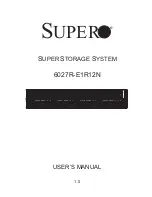
20
SPARC Enterprise T5140 and T5240 Servers Service Manual • July 2009
Check if the fault is
environmental.
(Flowchart item 6)
Determine if the fault is an environmental fault or a
configuration fault.
If the fault listed by the
show faulty
command
displays a temperature or voltage fault, then the fault is
an environmental fault. Environmental faults can be
caused by faulty FRUs (power supply or fan), or by
environmental conditions such as when computer room
ambient temperature is too high, or the server airflow is
blocked. When the environmental condition is corrected,
the fault will automatically clear.
If the fault indicates that a fan or power supply is bad,
you can perform a hot-swap of the FRU. You can also
use the fault LEDs on the server to identify the faulty
FRU (fans and power supplies).
•
Determine if the
fault was detected
by PSH.
(Flowchart item 7)
If the fault displayed included a
uuid
and
sunw-msg-id
property, the fault was detected by the Solaris Predictive
Self-Healing software.
If the fault is a PSH detected fault, refer to the PSH
Knowledge Article web site for additional information.
The Knowledge Article for the fault is located at the
following link:
(http://www.sun.com/msg/message-ID)
where
message-ID
is the value of the
sunw-msg-id
property displayed by the
show faulty
command.
After the FRU is replaced, perform the procedure to
clear PSH detected faults.
•
“Managing Faults Using the
PSH Feature” on page 43
•
“Clear PSH-Detected
Faults” on page 47
Determine if the
fault was detected
by POST.
(Flowchart item 8)
POST performs basic tests of the server components and
reports faulty FRUs. When POST detects a faulty FRU, it
logs the fault and if possible, takes the FRU offline.
POST detected FRUs display the following text in the
fault message:
Forced fail
reason
In a POST fault message,
reason
is the name of the
power-on routine that detected the failure.
•
“Detecting Faults With
POST” on page 34
•
“Clear POST-Detected
Faults” on page 41
Contact technical
support.
(Flowchart item 9)
The majority of hardware faults are detected by the
server’s diagnostics. In rare cases a problem might
require additional troubleshooting. If you are unable to
determine the cause of the problem, contact your service
representative for support.
TABLE:
Diagnostic Flowchart Reference Table
(Continued)
Diagnostic Action
Possible Outcome
Additional Information
Summary of Contents for SPARC Enterprise T5140
Page 1: ......
Page 2: ......
Page 6: ......
Page 82: ...56 SPARC Enterprise T5140 and T5240 Servers Service Manual July 2009 ...
Page 154: ...128 SPARC Enterprise T5140 and T5240 Servers Service Manual July 2009 ...
Page 234: ...208 SPARC Enterprise T5140 and T5240 Servers Service Manual July 2009 ...
Page 239: ......
Page 240: ......
















































